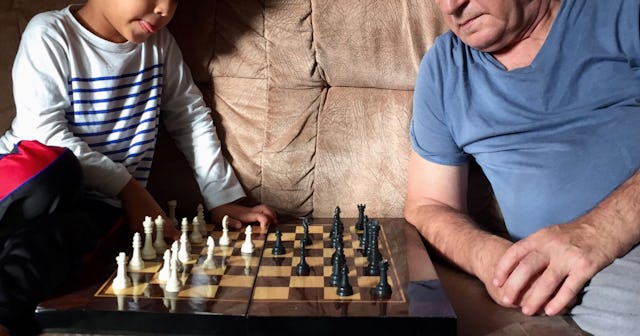When Grandparents Say You're 'Using Your Child As A Pawn'

Almost five years ago, I made the decision to cut off my own mother from myself and my children, and since then, I’ve fought tirelessly to uphold parental rights within the courts against grandparents’ visitation right suits (also known as third party visitation right lawsuits). I’ve Googled, I have read article after article — and mostly, when you look this up, you come to the general consensus that parents are evil and use their kids as “pawns” against grandparents or third parties who “just want to see the kids.” There are very few (if any) dissenting opinions, so I decided to write my feelings down.
The ultimate battle cry in grandparents’ rights groups is the complaint of adult children using their children (the grandchildren) as “pawns.” It’s like the grandparents who say this believe that this is a game (as pawns generally come from a game of chess) and they’re being kept from their prize so the parents can win the “game.” Some even say that this is “child abuse” and “elder abuse.” Let’s discuss that, shall we?
From a parent’s point of view who has been accused of such things, I will tell you truthfully that protecting your children from abuse, of any kind, is not using your child as a pawn. Ever heard a grandparent say they’re “so depressed, they need to see the baby to cheer them up?” This is emotional abuse. My child is not your dose of Xanax, lady, and is not responsible for your mental health. There’s also verbal abuse, and sometimes even physical. I’ll say it again: protecting your child from an abuser (or abusive behavior) is not using your child as a pawn.
Protecting your child is literally one of the most primal instincts one can have. If your mother or mother-in-law doesn’t hesitate to verbally lash you, whether in front of you or in private, then why do you think she will be kind to your children? Even if she is related to that child, she has expressed disdain and hatred for (or even “disappointment” in) one of these children’s parents, which literally makes up 50% of that child’s DNA. Again, for the ones in the back: if they hate you, or dislike you, or express discontent towards you, they are frankly saying that they dislike 50% of your child’s DNA. Protecting your child from these sorts of people is not “using them as a pawn.” It’s not a game; it’s your child’s emotions, mental health, and overall happiness.
Now, let’s dive a bit deeper, shall we? You don’t think that the grandparent in question would be unkind or abusive to the child… they just hate you, the child’s parent. After all, that’s why they’re accusing you of “using your child as a pawn,” and even abuse by withholding the child from the grandparent, right?
Well, let’s look up the literal definition of “pawn” as defined by Oxford Dictionary: “A chess piece of the smallest size and value, a person used by others for their own purposes.” By calling your child a pawn, they are straight up saying your child isn’t of much value beyond a bargaining piece.
So, I’ll say what I want to say every single time I see a grandparent accusing a parent of using children as pawns. Protecting your child is not, and will never be, abusive. Abuse runs deeper than physical abuse. And the grandparents know it. How many cut-off grandparents default to saying, “We spoiled our kids rotten, so it’s our fault she’s a brat” or similar? That right there tells you that you are protecting your child from emotional and mental abuse — that they’ve bestowed not only on their grandchildren, but on you both as a child and an adult.
It is parental instinct to protect your child from harm, and that is what you are doing.
Furthermore, if there happens to be a grandparent reading this and shaking their head in disagreement, let me ask you something to make you think a bit: if you love your grandchildren, why not be respectful to their parents and work on a relationship with them first, before bringing their children into the equation? And if your mind instantly jumped to insults or excuses on how “horrible” your son or daughter or son-in-law or daughter-in-law is, I encourage you to seek therapy — because you certainly don’t need to be around your grandchild while you’re actively disliking a person (their parent) who makes up 50% of their DNA.
And the first thing you should probably discuss with your therapist? Why you are comparing your grandchild to a game piece of little value.
This article was originally published on